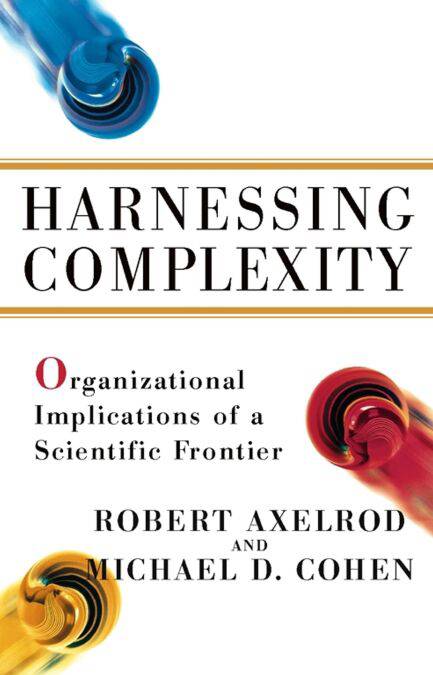
- Retrait gratuit dans votre magasin Club
- 7.000.000 titres dans notre catalogue
- Payer en toute sécurité
- Toujours un magasin près de chez vous
- Retrait gratuit dans votre magasin Club
- 7.000.000 titres dans notre catalogue
- Payer en toute sécurité
- Toujours un magasin près de chez vous
Harnessing Complexity EBOOK
Organizational Implications of a Scientific Frontier
Michael D Cohen, Robert Axelrod
Ebook | Anglais
15,65 €
+ 15 points
Description
Recent advances in the study of complexity have given scientists profound new insights into how natural innovation occurs and how its power can be exploited. Now two pioneers in the field, Robert Axelrod and Michael D. Cohen, provide leaders in business and government with a guide to complexity that will help them make effective decisions in a world of rapid change.
Building on evolutionary biology, computer science, and social design, Axelrod and Cohen have constructed a unique framework for improving the way people work together. Their approach to management is based on the concept of the Complex Adaptive System, which can describe everything from rain forests to the human gene pool, and from automated software agents to multinational companies. The authors' framework reveals three qualities that all kinds of managers must cultivate in their organization:
Variation What is the best way to manage the development of software? Should the problem be broken up into small pieces for programmers working independently, thus enhancing variation, or should there be a centralized hierarchy of programmers ruled by a chain of command? The authors show how the decentralized creation of variation combined with the centralized maintenance of standards was the key to the success of the Linux "open source software" project, which brought together thousands of volunteers in cyberspace to produce an operating system that can outperform Microsoft's.
Interaction Why did northern Italy prosper while southern Italy remained poor? Recognizing the internal interactions of a Complex Adaptive System -- be it a national region, a company, or a nonprofit group -- reveals vital networks of trust. Axelrod and Cohen explain that in successful adaptive systems, rich networks of horizontal linkages foster cooperation and provide an advantage over other less cooperatively networked groups. In the case of Italy, voluntary associations created networks of trust in the Middle Ages that became northern Italy's critical advantage over the south.
Selection Is a Pulitzer Prize better than a National Book Award? How can foundations and corporations design competitions that have a positive effect on the evolution of excellence? The authors' framework makes clear that the worst selection processes are mired in orthodox standards that have not adapted to a new environment. The best selection processes, on the other hand, are created and run by leaders who understand how the standards they use can transform their organization and its environment.
This simple, paradigm-shifting analysis of how people work together will transform the way we think about getting things done in a group. Harnessing Complexity is the essential guide to creating wealth, power, and knowledge in the 21st century.
Building on evolutionary biology, computer science, and social design, Axelrod and Cohen have constructed a unique framework for improving the way people work together. Their approach to management is based on the concept of the Complex Adaptive System, which can describe everything from rain forests to the human gene pool, and from automated software agents to multinational companies. The authors' framework reveals three qualities that all kinds of managers must cultivate in their organization:
Variation What is the best way to manage the development of software? Should the problem be broken up into small pieces for programmers working independently, thus enhancing variation, or should there be a centralized hierarchy of programmers ruled by a chain of command? The authors show how the decentralized creation of variation combined with the centralized maintenance of standards was the key to the success of the Linux "open source software" project, which brought together thousands of volunteers in cyberspace to produce an operating system that can outperform Microsoft's.
Interaction Why did northern Italy prosper while southern Italy remained poor? Recognizing the internal interactions of a Complex Adaptive System -- be it a national region, a company, or a nonprofit group -- reveals vital networks of trust. Axelrod and Cohen explain that in successful adaptive systems, rich networks of horizontal linkages foster cooperation and provide an advantage over other less cooperatively networked groups. In the case of Italy, voluntary associations created networks of trust in the Middle Ages that became northern Italy's critical advantage over the south.
Selection Is a Pulitzer Prize better than a National Book Award? How can foundations and corporations design competitions that have a positive effect on the evolution of excellence? The authors' framework makes clear that the worst selection processes are mired in orthodox standards that have not adapted to a new environment. The best selection processes, on the other hand, are created and run by leaders who understand how the standards they use can transform their organization and its environment.
This simple, paradigm-shifting analysis of how people work together will transform the way we think about getting things done in a group. Harnessing Complexity is the essential guide to creating wealth, power, and knowledge in the 21st century.
Spécifications
Parties prenantes
- Auteur(s) :
- Editeur:
Contenu
- Nombre de pages :
- 208
- Langue:
- Anglais
Caractéristiques
- EAN:
- 9780743203739
- Date de parution :
- 11-05-00
- Format:
- Ebook
- Protection digitale:
- Adobe DRM
- Format numérique:
- ePub







